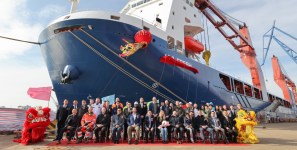Ocean Alliance Stalled by U.S. Federal Maritime Commission
Not so fast, OCEAN Alliance.
It was full steam ahead for the four shipping companies planning to join forces by April of 2017, until William P. Doyle, a U.S. Federal Maritime Commissioner, decided there were still some questions that needed answers.
Doyle voted in favor of requesting additional information, and was joined in this effort by Federal Maritime Commission (FMC) Chairman Mario Cordero and fellow commissioners Michael A. Khouri and Daniel B. Maffei.
The Final Hurdle
The Ocean Alliance is comprised of COSCO, CMA-CGM (which recently acquired Neptune Orient Lines and its APL subsidiary), Evergreen Line and Orient Overseas Container Line (OOCL).
An alliance agreement was filed with the FMC on July 15, 2016, and would have become effective in 45 days, on August 29, absent of FMC action.
Regulatory approval would also be necessary from the Chinese and the European Union, but neither of these entities has voiced any concern. EU approval is basically self-regulating, and China is home base for two of the alliance’s container carriers.
The FMC’s action is not unusual. Previous carrier alliances have also been subject to closer scrutiny.
“I pay special attention to competition matters especially to small businesses, downstream participants and the upstream – supplier and vendor markets,” Doyle said in explaining his decision.
“We’ve been down this road before with language proposed but not implemented by the P3 Alliance and the language in the existing 2M Alliance (between Maersk and MSC),” Doyle added. “I’d like to see fair dealing and transparency in how the parties handle negotiations with third parties, suppliers, small businesses and other service providers. Using their proposed buying power through proposed joint purchasing agreements could harm both downstream and upstream participants.”
What Happens Now?
Questions have been asked through a Request for Additional Information (RFAI), and now answers must be provided. Best-case scenario: that happens quickly, and the agreement will go into effect after another 45-day waiting period.
But if those answers do not satisfy FMC concerns about competition and transparency, the commission could seek an injunction.
Even with this delay, however, the Ocean Alliance remains on schedule to implement their agreement in April 2017. As of now, the RFAI is viewed more as a speed bump than a roadblock.
“There is plenty of time for the Ocean Alliance parties to review and digest the questions posed by the commission,” said Doyle. “I encourage Ocean Alliance representatives to work with FMC staff in answering the RFAI.”





Leave a Reply